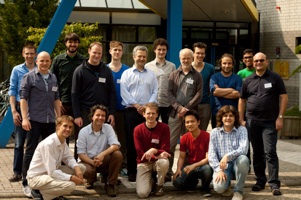Event: 18-22 June 2012: NDNS+ Applied Dynamical Systems Summer School 2012 M1204
NDNS+ Applied Dynamical Systems Summer School 2012
Date: 18-22 June 2012
Location: University of Twente: Conference Hotel Drienerburght, Enschede, The Netherlands.
Audience: Ph.D. students and advanced Master's students in Mathematics and Physics, whose research interests focus on nonlinear analysis and dynamical systems.
This five-day winter school focuses on certain behavioral aspects of nonlinear evolution equations assuming the form of PDEs and delay/renewal equations arising in a wide array of applications. It is aimed at Ph.D. students and advanced Master's students in Mathematics and Physics, whose research interests focus on nonlinear analysis and dynamical systems.
Organization: Antonios Zagaris (UT), Adrian Muntean (TU/e) and Jens Rademacher (CWI)
Scientific Report
Following the successful 2010 winter school held at Universiteit Twente, this summer school concerned large scale phenomena and associated reduction in dynamical systems. The topics covered within this broad area were:
- Ergodic Theory, which was introduced by Evgeny Verbitskiy (UL/RUG) on Monday and Tuesday morning.
- Dynamic aspects of Variational Calculus (Gamma Convergence and applications), presented by Alexander Mielke (WIAS) on Monday, Tuesday and Wednesday.
- Mean Field Limits by François Golse (École Polytechnique) on Tuesday, Wednesday and Thursday.
- Classical Gamma Convergence by Lucia Scardia (TU/e) on Thursday and Friday.
The summer school went as planned, with a satisfactory number of participants (15 plus instructors) from a wide range of universities across The Netherlands and Europe. The lectures were complemented by guided problem sessions and contained numerous examples of applications. The participants’ notes and presentations (slides) have been uploaded to the school website and are now publicly available. The notes are also planned to appear in a proceedings publication.
Both lecturers and participants expressed their satisfaction with the planned activities and the school’s overall quality. The participants particularly benefited from the carefully planned problem sessions, which helped to reflect upon and digest the excellent lectures; they also clearly enjoyed the social activities. In a related vein, the organizers deem successful their decision to not supplement the school with invited talks (as was the case for the 2010 school); indeed, this was decided on the basis of feedback from the 2010 school. This freed up Friday–thus allowing us to increase the number of lecturers from three to four–and all evenings–which enabled direct interaction between participants and lecturers and also gave the former time to prepare for next day’s lectures.
Date: 22 June 2012



